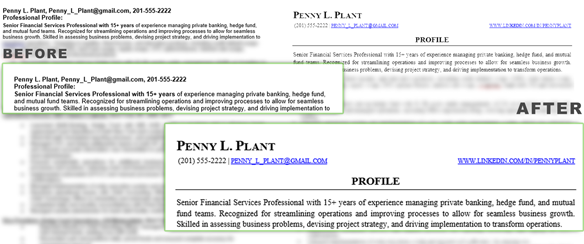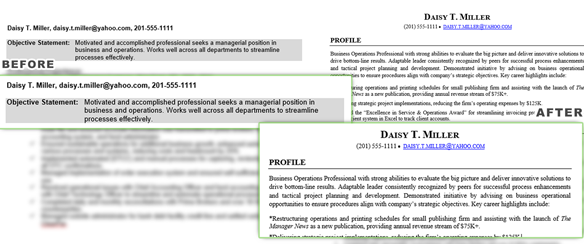
You’re sitting at your computer, looking over your resume…again. Are the right details included? Is there anything you should leave off? How can you make it better? What will make your resume stand out to a hiring manager?
A resume is a marketing document that tells your career story; crafting the best one for the job you want is key. Developing your resume can be daunting – here are some tips to improve yours.
Call Me…Maybe
Who are you? Make it easy for hiring managers to get in touch with you – clearly include your contact details. Style your name with a larger font than any other part of your resume to make it stand out.
Provide an email address, phone numbers, and your LinkedIn profile address. Include a professional-sounding email; something like iamgreat@yahoo.com is really not recommended. Do not use your current work email or work phone number on your resume – or for anything having to do with your job search for that matter. This could jeopardize your career in many ways!
Don’t make a hiring manager have to search for your information, they will move on to the next person! Format your resume in a way so that your details are easily located and easy to read. Take a look at the following, and see how it was improved:

There are a variety of ways to format this part of your resume; this is a sample we have found to be effective for our clients.
Show Your Value
Utilize your profile section to bridge a connection between your skills and the value you offer to a potential employer. Showcase your capabilities, and highlight your best achievements upfront to demonstrate how you can contribute successfully to their business. This is shown above your professional experience and below your contact details, and is the first part of the resume that a hiring manager notices. You want to make the best first impression here by showing what you excel in and strengths you possess.
Assemble your profile choosing keywords from the job description of the position you’re applying for; weave these throughout your summary to demonstrate you’re a good match for the role. Keep in mind what the employer is looking for, so you can personally align your resume with their opportunity.
Stay away from an Objective Statement. This is not the best way to highlight the benefits you can bring to a company. With so many resumes being submitted per job application, you need to use the space you have wisely. If you simply state that you’re “looking for a challenging position to utilize my communication skills,” you’re sure to be skipped over. How can a potential employer see value in that statement? It’s hard to determine what you can potentially bring to the table when stating what it is YOU’RE LOOKING to do.
Consider the following examples. Can you tell which one a hiring manager will notice, and stay interested enough to read on?

Which one do you think is more enticing?
Using an Objective doesn’t showcase what abilities you have, what potential you offer a company, nor is it really interesting in any way.
The after example gives a more expanded view into your skills, and highlights career accomplishments that a hiring manager will see as value for their own company. There are different options of formatting that you can use for your profile section – this is an example of something we have found successful.
In this section – and throughout your resume – avoid using long blocks of text, such as paragraphs longer than 5 lines. Use concise sentences and focused bulleted statements to make it easier to read, and get noticed!
Customize It (Then Do It Again)
Yes it’s a pain to have to adjust your resume for each application, but customizing it will help prove you’re a good fit. Use the job description to include important keywords and phrasing not only in your profile section as mentioned, but do this throughout your resume.
Say you’re applying for an operations role. The application says they need someone with extensive project management and planning experience…and you have that! Focus your resume on your specific project management skills, and highlight improvements you made with your strategic project planning that attributed to positive bottom-line results. For example:
“Recommended tactical project management and planning improvements in operational activities, saving the firm more than $50K in annual expenses.”
Do not use the same resume for every job you apply for. You’re not putting your best qualifications forward if you don’t target it for specific job roles. Prove you’re a good fit by aligning it each time with the job description, and make every word count!
Say My Name
Giving your resume document a proper name is another opportunity for you to market yourself! Many people miss out on this. You need to identify yourself easily to hiring managers – and for the role you’re applying to. Calling it “Resume.doc” is not a good idea! You should also not date your resume. Check out the following examples, and you can see for yourself which is more effective. This can be adjusted, just like your resume, for each job application:
Example 1: “myresume2013.doc”
Example 2: “Daisy T. Miller-Business Operations Professional.doc”
Your resume needs to be a well-thought out, professional-sounding document that demonstrates your skills and value to a potential employer. It should emphasize your accomplishments and strengths to enhance your chances of getting an interview. Using these tips will help get your resume noticed – and when your resume gets noticed, you get calls for interviews! Good luck and success in your search!
This article originally appeared on CareerFuel



